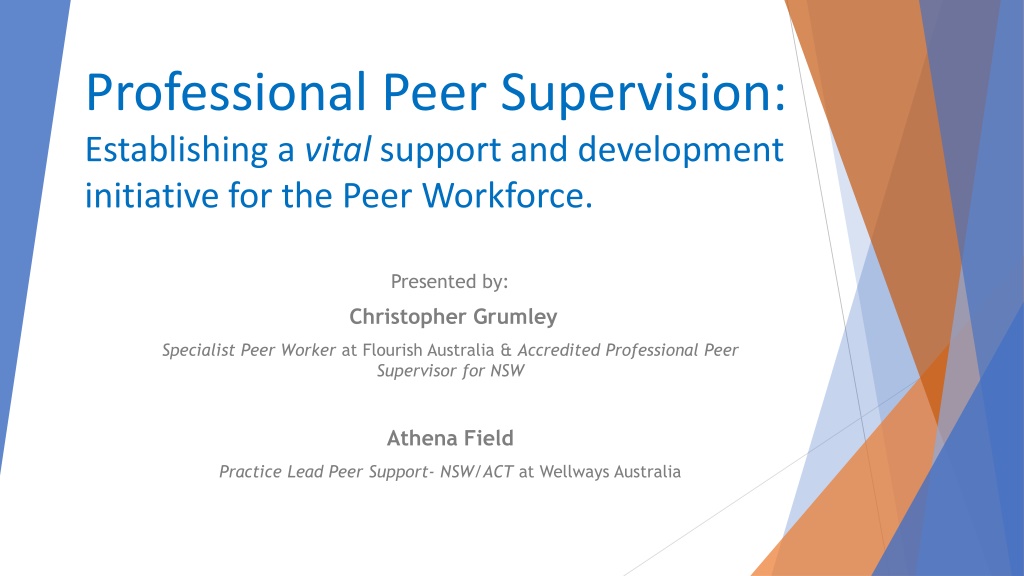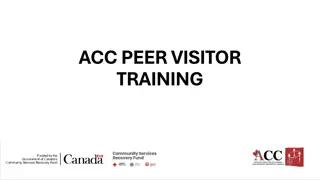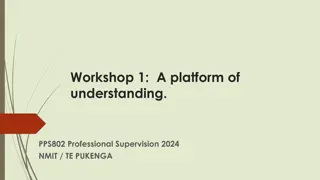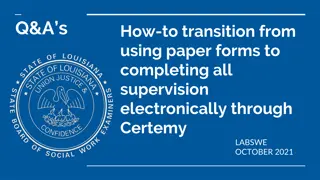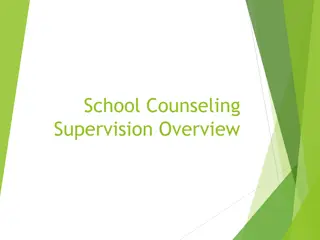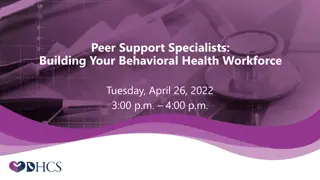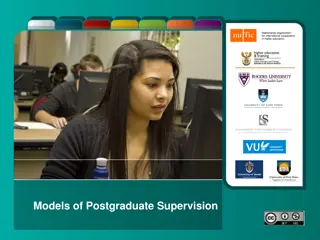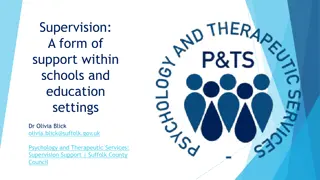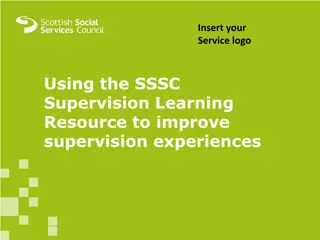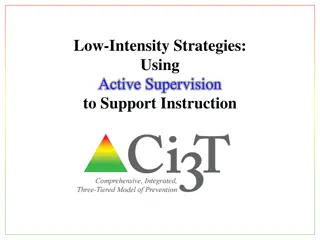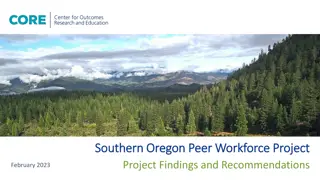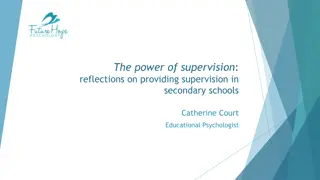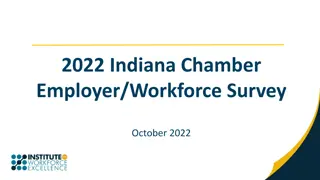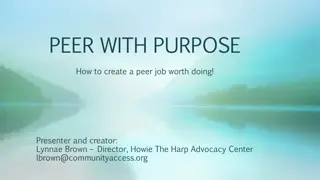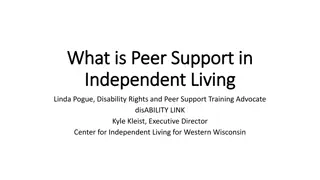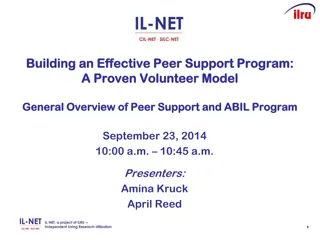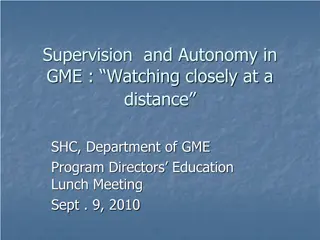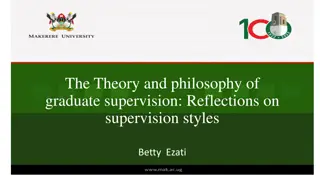Professional Peer Supervision: Enhancing Support and Development for the Peer Workforce
Chris Grumley, a Specialist Peer Worker at Flourish Australia, presents the importance of Professional Peer Supervision in supporting and developing the Peer Workforce. The benefits include critical reflection, accountability, and nurturing expertise. The focus is on utilizing Lived Experience, well-being, career progression, and exchanging resources to enhance Peer Work practice. This model differs from traditional supervision by emphasizing personal growth and peer support over performance management.
Download Presentation

Please find below an Image/Link to download the presentation.
The content on the website is provided AS IS for your information and personal use only. It may not be sold, licensed, or shared on other websites without obtaining consent from the author. Download presentation by click this link. If you encounter any issues during the download, it is possible that the publisher has removed the file from their server.
E N D
Presentation Transcript
Professional Peer Supervision: Establishing a vital support and development initiative for the Peer Workforce. Presented by: Christopher Grumley Specialist Peer Worker at Flourish Australia & Accredited Professional Peer Supervisor for NSW Athena Field Practice Lead Peer Support- NSW/ACT at Wellways Australia
-Acknowledgement of Country- -Acknowledgement of Lived Experience-
What are the benefits of Peer Supervision? Ongoing critical reflective practice of Peer Work practice, knowledge and skills Accountability and exploration of Peer Work specific values Professional and Personal Development (with reference to the profession s unique circumstance in their overlap). Equitable access to Peer Work specific development Nurturing and building Peer Worker s expertise, confidence and capacity to reinforce future enhancement of the profession as a whole Opportunity to have Peer Work practices/values/relationships role modelled in real time
What is focused on in Professional Peer Supervision? Skills and practices on using your Lived Experience meaningfully and purposefully. Exploring the effect the work has on you as a person, and the effect you as a person has on your work. Wellbeing and meaningful self-care practices and understanding, and its connection to ongoing Peer Work practice Guidance in career progression tools and other initiatives that may support this journey The sharing of resources and information that can affect Lived Experience expertise and Peer Work practice Exchanging perspectives on certain issues and situations that may have been challenging. How this supports capacity building and confidence.
Differences to other kinds of Reflective Practice and Supervision models Does not delve into the realms of: Focuses on: Performance management Guidance Productivity Widening scope/perspective Assessment Pure reflection Any non-relevant aspects of your day to day work Reframing issues/barriers Mutuality and Reciprocity Peer Supervisors problem solving for Peer Workers Compassionate challenging Perpetuating power dynamics
Conflicts of Interest to consider Peer Supervision not being facilitated by Peer Workers Peer Supervisor having inadequate experience as a Peer Worker or from engaging in authentic Peer Work practice. People providing Peer Supervision without training on how to facilitate it appropriately. Access to notes/information from Peer Supervision sessions by others. Previous or dual relationships between the Peer Worker and Peer Supervisor. Eg, direct line-management, personal relationship, Peer supervisor working alongside Peer Worker s manager or with(in) their team/area. Peer Supervisors not engaging in their own Peer Supervision.
Barriers to providing meaningful and appropriate Peer Supervision Productivity demands within service delivery for Peer Workers being seen as a constant priority. This includes other ways time may not be allocated. Decision makers not understanding or seeing the worth of Peer Supervision (or other kinds of Peer Work professional development). Peer Work not being widely recognised as a practice, unlike other professions that require Professional Supervision. Individual LHD s, organisations and services having differing expectations, understanding and/or investment in the professional development and support of their Peer Work staff. Ability to fund Peer Supervision Access to appropriate training and accreditation for suitable individuals to become Peer Supervisors.
Keeping it Authentic and Valued Building a Peer Supervision program internally within an organization. Examples from Flourish Australia s Professional Peer Supervision program. The risks of compromising best practice Challenging with Respect and Compassion Access vs Value & Investment
Reflections from a Peer Supervisee How it happened Identified need for professional development Resource not available internally at time, external Peer Supervision recognised as best option Benefits: Reference to conflicts of interest Capacity and strengths building Reflect and grow in a Peer way Outcomes: Overall professional growth for self and for organization due to this Reduced isolation and stress Fresh insights and ideas, innovative approaches and inspired further training and resources.
References: National Lived Experience (Peer) Workforce Development Guidelines National Mental Health Commission- 2021 Professional Peer Supervision Accreditation training BEING Mental Health Consumers Inc 2021 National Review of Experiences and Values of Discipline Specific Supervision from the Perspective of Mental Health Lived Experience Peer Workers, Supervisors and Managers Project Report from the Yale University Let(s)Lead, Lived Experience Transformational LEADership Academy 2022, by Paula Hanlon Flourish Australia s Professional Peer Supervision Program framework What it takes: Wisdom from Peer Support Specialists and Supervisors Edited by: Rita Cronise, Jonathan P . Edwards, Gita Enders and Joanne Forbes
